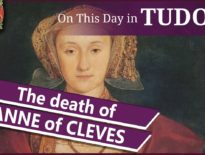On this day in Tudor history, 17th July 1555, Richard Carew, was born at Antony House, Torpoint, in Cornwall.
As well as serving his county and country in several offices, Carew was also an antiquary, bee-keeper, translator and poet. He is known for his book a "Survey of Cornwall", which has been reprinted on several occasions over the centuries. You can read it at https://archive.org/stream/surveycornwalla00caregoog#page/n10/mode/2up
Find out all about this multi-talented Tudor man in today's talk.
Also on this day in Tudor history, 17th July 1555, Protestant martyrs Christopher Wade (Waid) of Dartford, linen-weaver, and Margaret, or Margery, Polley, a widow from Pepenbury, Tunbridge, were burned at the stake for heresy. Find out more about them in last year’s video:
Also on this day in history:
- 1497 – Death of Sir James Ormond (Butler), administrator and illegitimate son of John Butler, 6th Earl of Ormond, in a duel with Sir Piers Butler, near Kilkenny. The Butlers of Ormond were related to Thomas Boleyn, Queen Anne Boleyn's father.
- 1537 – Burning of Janet Douglas, Lady Glamis, on the castle hill at Edinburgh after being found guilty of two counts of treason. She had been charged with plotting the King's death (by poison) and assisting and corresponding with her brothers, Sir George Douglas and Archibald Douglas, 6th Earl of Angus.
- 1565 – Death of Sir Thomas Dacre of Lanercost, illegitimate son of Thomas Dacre, 2nd Baron Dacre. He died while holding the office of Sheriff of Cumberland.
- 1601 – Death of Richard Latewar, poet, theologian, Vice-President of St John's College, Oxford, and chaplain to Charles Blount, 8th Baron Mountjoy. He died from a gunshot wound sustained in a skirmish at Bennurb, in Ireland, while on a campaign there with Mountjoy. Latewar was buried at Armagh Cathedral, and a monument was erected to him in the chapel of St John's in Oxford.
Transcript:
On this day in Tudor history, 17th July 1555, antiquary, bee-keeper, translator and poet, Richard Carew, was born at Antony House, Torpoint, in Cornwall. Carew was a member of the Elizabethan Society of Antiquaries, and his works included his “Survey of Cornwall”, a county history.
But let me tell you a bit more about this multi-talented Tudor chap…
• Richard Carew was the eldest son of Thomas Carew and his wife Elizabeth Edgcumbe.
• When he was just 8 years old, he inherited his father’s estate following his father’s death.
• Carew was educated at Christ Church, Oxford, where he was friends with historian and antiquary William Camden and poet Philip Sidney, and then he studied law at the Middle Temple, one of the four inns of the court in London. He taught himself Greek, Italian, Spanish, German and French.
• He married Juliana Arundell in his home county of Cornwall in 1577 and they went on to have ten children together.
• At his Cornish estate, Antony House, Carew was a keen bee-keeper and fisherman, but he managed to mix spending leisure time at home in the country with public office. He served as a Justice of the Peace, a burgess, bailiff, sheriff, deputy lieutenant, treasurer of the lieutenancy, and colonel of the regiment in Cornwall between 1581 and 1597.
• Carew was also an intellectual, and produced translations of famous Italian, Spanish and French works. It is also thought that he wrote the anonymously published poem “A Herring’s Tayle”. He was very interested in language and etymology, and wrote “The excellencie of the English tongue”. His interest in the English language led to him becoming involved in a dispute over whether the English language should assimilate foreign words, or be pure. Other involved in this dispute included William Shakespeare, Thomas Nashe, Edmund Spenser, and Verstegan. Historian S Mendyk explains that “Carew accepted Saxon as the 'natural language' of England (Jones, 220), but he was much more willing to recognize the contributions of foreign tongues and cultures than Verstegan was.”
• In 1602, he published his two volume county history, “Survey of Cornwall”, which was dedicated to Sir Walter Ralegh.
• Following its publication, Carew’s health began to go downhill and he lost much of his sight. He died at his home, Antony House, in his study, on 6th November 1620. He was laid to rest in the local parish church on 7th November, in the crypt. Only five of his ten children outlived him, and he bequeathed his estate to his wife and his second son, Richard.
• Carew has been referred to as “the prince of Cornish historians” and his Survey of Cornwall has been reprinted on several occasions, the most recent being 1953.



Leave a Reply